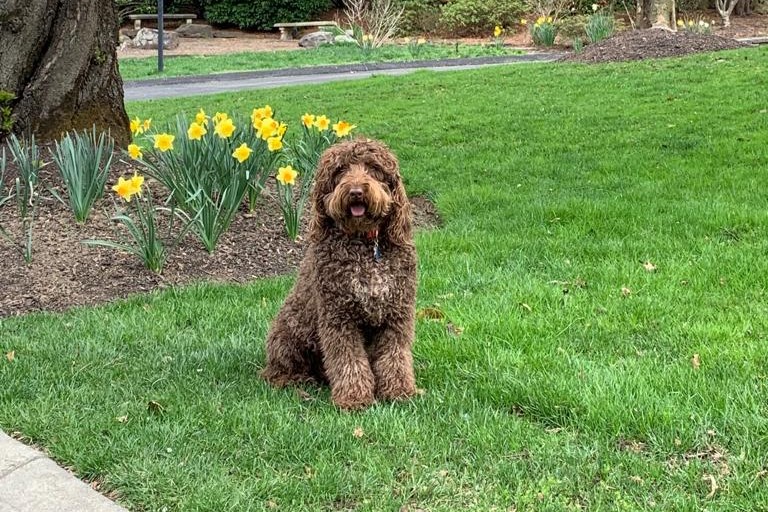Life lessons from my dog
My dog, Calvin, poses in front of the Kenwood cherry blossoms back in April. Throughout our five years together, Calvin has taught me about life in ways that my favorite human mentors never could.
May 14, 2019
Sometimes in life, we find our best teachers in the places we would least expect. I found one of mine at a breeders farm in Cooksville, Maryland—my dog Calvin.
Calvin is a labradoodle with curly brown hair and a tail that never seems to hit the floor—it literally rests on his back for some unknown reason. Although his sixth birthday approaches, he continues to leap sideways like a puppy when chasing after tennis balls. When it’s not playtime, though, he’s laid back and mellow as can be. During our years together, Calvin has taught me about life in ways that my favorite human mentors never could. Here is some of what I’ve learned.
Strangers=friends
Most of us are well aware of stranger danger; since learning to walk, we’re taught to be wary of new faces. But because of my dog’s burning desire to gallop toward every person we walk by, I’ve learned that first impressions can be deceiving. Just because an adult you don’t know starts talking to you, it doesn’t mean they have bad intentions. As long as you use caution, striking up small talk with strangers can be extremely rewarding.
For example, I used to avoid speaking to one of my neighbors—he always seemed to be staring oddly into space and lurking, which made him appear slightly threatening. One day while walking Calvin, I relaxed my grip on the leash and he yanked me down the block toward the man. Turns out, my neighbor is blind and is harmlessly charming. I instantly felt terrible for ever avoiding him, and if it hadn’t been for Calvin’s determination to greet him enthusiastically, I would’ve closed myself off to interaction with him permanently. I would never have found out that he grew up in the house he still lives in and that he went to my elementary school.
Woof loud
Despite the fact that humans are supposedly more intelligent than dogs, my dog reminds me of the value of clear communication. Calvin is always upfront about how he feels: whether it’s aggressively ripping apart mail or sulking in the corner right afterward because he’s worried I’ll be upset, he’s never vague about his emotions. While it sure is frustrating to have to tape all the mail back together, I appreciate that he acknowledges his wrongdoings and is brave enough to approach me afterwards to apologize. It might sound silly, but it’s important to learn from dogs that proper and direct communication avoids conflict and inspires forgiveness.
Live in the moment
While it’s impossible to know for sure, I have a deep conviction that Calvin has a remarkable ability to live in the moment. He doesn’t seem to dwell on the past or spend his time constantly worrying about tomorrow (except when he waits for my family to return home). Instead, he’s always engaging with the world around him, whether chasing rabbits or rolling through the grass. Because his body language makes it so clear when he’s anxious or upset, it’s quite easy to notice how often Calvin is joyful. While people often take days or weeks to move on from mistakes or conflict, Calvin’s tail is usually back wagging within minutes. A dog’s brain may gravitate towards this lifestyle more naturally than the human one, but people can still take inspiration from this way of living and try to focus more on what really matters: family, friends and spreading humor or playfulness while we are in good health.
Embrace tail wagging
No matter the situation, Calvin has always accepted praise—another thing I find remarkable about dogs. People frequently shy away from compliments out of humility, insecurity or both. But watching Calvin leap in circles and thump his tail when called a good boy reminds me that instead of deflecting compliments, we should be grateful for them. Own your accomplishments and embrace recognition of your strengths, whatever they may be.
Dogs may seem like simple creatures, but they’re wise beyond their years and so much more than a companion. They value aspects of life that we should be more grateful for, and they set an example for how we should openly express our emotions, accept praise and live centered in the present.









Pecky Iturregui • Jun 26, 2019 at 12:45 pm
Loved it!! Writings to enlighten anyone’s life from the bottom of your heart!! Great examples, specially the one of your neighbor! Congratulation Emma!!
Veronica • Jun 25, 2019 at 10:50 pm
This is probably the best article I have ever red. Calvin is such a perfect pup. LOVE LOVE LOVE!
Hirari Sato • Jun 12, 2019 at 8:31 pm
CUTE LOVE YOU